On this page:

The first wave of COVID-19 and the school closures in March were an unexpected blow to all of these groups. Our Kids described private schools’ experience and lessons learned during the spring lockdown in a four-part series of articles which explore learning in these extreme conditions from the point of view of schools, students, and parents. Despite the difficulties and challenges, the conclusion was as follows: private schools coped very well with the difficult, unexpected crisis. There are many reasons for this success, including small classes, allowing for significant individualization of teaching, direct contact between the teacher and each student, schools’ technological acumen, as well as focusing on interpersonal relations, community, and empathy.
Back then, nobody expected the crisis would last so long.
After the summer holidays, in September, despite the protests of many teachers who asked for hybrid education, the educational authorities decided that all schools and kindergartens, regardless of their resources and conditions, would start in-person teaching. Transitioning to other systems (hybrid or fully remote), in cases of COVID-19 outbreak, was to be decided upon by the principals based on the approval of the authorities.
All schools faced a great challenge. It was, however, only the first step on a difficult road. Due to the worsening epidemiological situation, further restrictions were introduced:
• On October 19, the government decided to close secondary schools and universities and introduce compulsory remote learning there.
• On October 26, a shift was made to remote teaching of older primary school students (Grades 4 to 8).
• On November 9, students in Grades 1-3 of primary schools were transitioned to online learning.
So, after less than two months of normal work following the summer holidays, schools stopped teaching in person.
How do schools evaluate their post-vacation experiences? What was their work like and how did they teach when it was time to return to the classroom? How were they prepared for this? And what will happen now that distance learning has been reintroduced?
The school members of the Our Kids community have provided us with detailed information about their working methods, what they provided for students (and parents), and how it worked.
Modifications of work formats in schools: innovative solutions
The pandemic made it necessary to adapt the forms of school work to the new restrictions. Schools showed great creativity in implementing these modifications.
It has become impossible to organize traditional open days where families and prospective students can visit schools and learn more about them. Therefore, schools organized virtual open days, e.g., on Zoom as well as virtual tours of school campuses. Akademeia High School has planned the entire recruitment weekend for November 21-22, and from November to April—there will be a new format of meetings with potential candidates for the school and their parents—monthly Online Open Evenings with the presence of the principal, students, and the recruitment team.
Faced with the prospect of another lockdown, schools planned in advance to expand the online offer. PRIMUS schools (Private Primary School No. 47 and Private Secondary School) have transferred a number of offline projects online, such as the "Primus Mathematical Academy," and a pilot graphic tablet project will soon be implemented.
Akademeia High School regularly hosted online meetings, lectures and seminars, and also hosted an alumni online art exhibition - Graduation Show.
At the Polish-English School Edison, a virtual after-school club opened so children could benefit from optional classes, developing their passions and interests.
Monnet International School has transferred their cycle of "very cool (tural) meetings," held since 2005, to an online format—Tomasz Jastrun was the guest of the first such online event.
When the schools were still open, they also decided to combine the possibility of personal participation in various events with a remote form. The Polish British Academy of Warsaw reports that this year's celebration of the United Nations Day was different from previous ones. “This school year we celebrated the celebration in class only (live and online). (...) Students from Grades 0-3 who studied in person organized Halloween. There was no annual disco, but the kids had a great time creating scarecrows and masks. Of course, we didn’t forget those who had online learning."
The International American School implemented O.M.O. (online-merge-offline) in September: "This allowed for our students to rotate between in school and at home learning environments, and to be in the classroom even when they are not. The students are able to view the physical classroom, interact directly with their teachers, all in a merged environment with their physically present peers.”
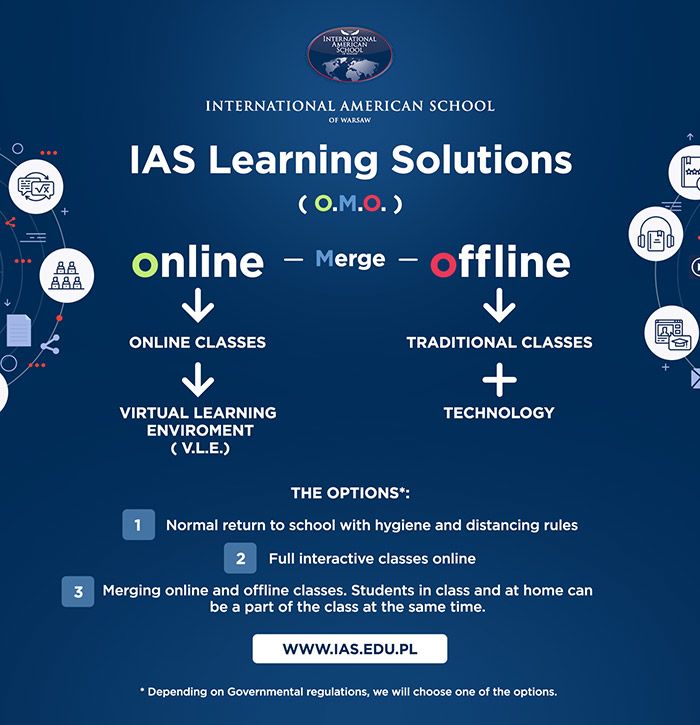
The British School Warsaw has implemented two systems:
• Classroom Connect (see photo below): temporary format, for students who are in quarantine or unable to participate for some reason (illness, distance): live streaming from specially purchased wide-angle cameras, which allows students to participate in the lesson remotely.
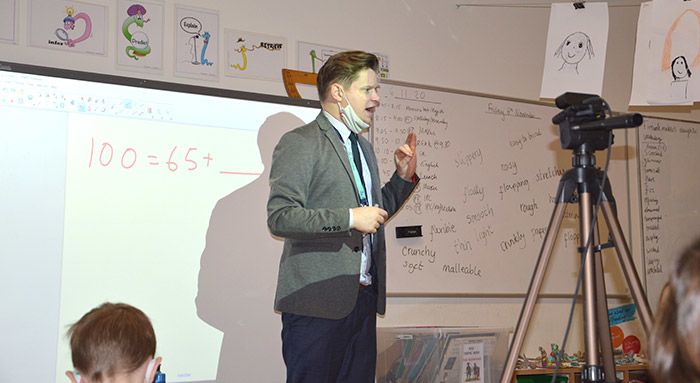
• Virtual School Experience (VSE), a fully virtual learning system, in use in spring and now again, available through the Nord Anglia educational network of which the school is part, with a global education team creating educational materials for specific age groups. They are made available through the global internal platform Global Campus, a huge resource base of modern and interactive knowledge, which is used by both teachers when conducting lessons in an interactive way, and parents and students for individual work.
As long as students were coming to school, it was important to ensure as much outdoor activity as possible. Active time outdoors was considered a very important part of learning at The Canadian School of Warsaw.
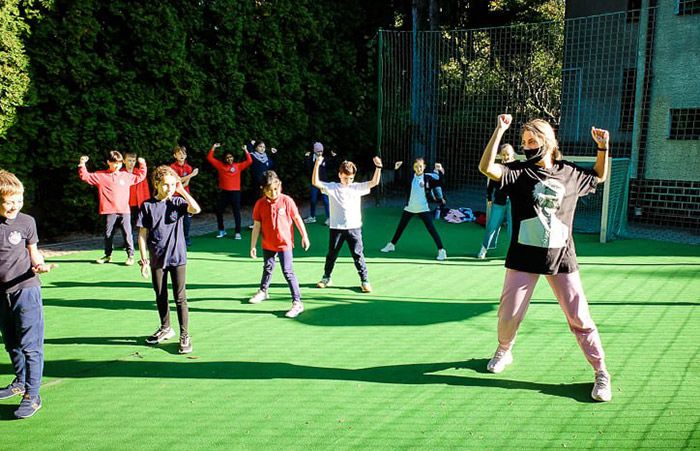
Canadian School of Warsaw
When it comes to remote teaching, one should not forget about exercise and physical activity, because learning online, students usually spend too much time in front of the screens and in a sitting position. “In order to ensure sustainable development for our students, we introduced an hour-long break in the middle of the day between lessons for physical education and dance teachers,” says Agnieszka Olszewska, principal of the Polish-English Edison School.
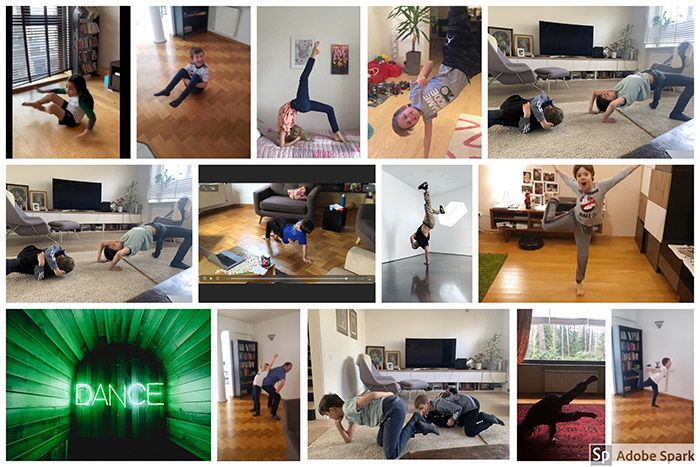
British School Warsaw
Graham Lewis, principal of the newly established international Wrocław Cosmopolitan School, citing Polish distance learning research published by Centrum Cyfrowe, emphasizes his school’s “ensuring there was a balance of screen time and not trying to replicate the schedule and format of learning at school.”
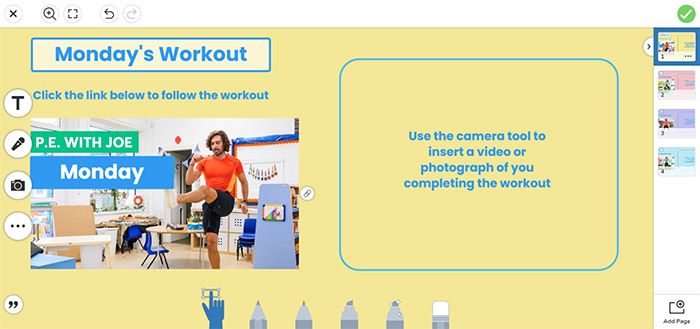
Wrocław Cosmopolitan School
With the strict restrictions in force, schools did not allow strangers to enter their premises, but made sure that these restrictions did not mean shutting themselves off from the outside world. Natalia Boszczyk from the high school Liceum Niepubliczne nr 43 im. Lotników Amerykańskich Polskiego Stowarzyszenia Promocji Oświatowych reports: "We are open to outside guests - as during this year's Night of Libraries, when we invited a guest from Konstancja, Romania - a philosopher, Jarosław Spychała, or during a conversation about our strengths and talents with Izabela Antosiewicz from Przytulam.pl. We use lessons offered by the Polish museums websites or other online institutions - remote learning does not have to mean closing oneself to new places."
Not only academics
As shown by Our Kids’ research (a survey conducted among parents of private school students) regarding the reasons for their choice of private schools, the number one reason was the desire to provide them with emotional security, which is often difficult to find in public schools, and which is a characteristic feature of private schools (for the results of the survey and the report on the condition of private education in Poland 2019 please read: Reasons for choosing private schools - Our Kids' survey report)
In their reports on learning and teaching during the second wave of the pandemic, in addition to academics, private schools members of the Our Kids community emphasized the importance of the emotional and social aspects and the role of the school in providing students with a sense of security and comfort in this regard.
The British International School of the University of Łódź reports: "We are aware that this situation can also negatively affect the mental state of our students, which is why our school psychologist is available online." To make the students feel better, the school also makes sure they do more than just study: "In order to provide the students with a bit of entertainment, we organize various events, competitions, and activities."
This non-academic aspect of school life is taken care of by the Open School, whose principal Anna Kozicka explains: “In our Open School, the relations are the basis of joyful education. It is the foundation on which we build the rest. Therefore, our online classes schedule could not be complete without group and individual meetings with the Talent Tutor. Various things are happening there: telling jokes, watching movies and talking about them, games, and fun. Probably soon we will organize cookie baking and cooking workshops. The purpose of these meetings is simply to be close to one another, maintain the group spirit, and support the students in this difficult time. On the request of our girls, on Friday there was time for "girl time," where female students from all classes can meet." In addition, the school psychologist meets individually with students, discussing topics important to them.
Liceum Niepubliczne nr 43 im. Lotników Amerykańskich Polskiego Stowarzyszenia Promocji Oświatowych has also been focusing on relationships for years. Hence, many interesting ideas, for example "teachers and students have created a school e-corridor on the Facebook group "Aviators and corona-adventures", where they exchange ideas, share announcements and tips. we have an action called "Christmas is coming, so what book to buy for ...". This group builds our sense of community and is a virtual meeting place."
Schools not only care for students, but also provide support and help to families and teachers. Pro Futuro principal Żaneta Cornily, who emphasizes the importance of interpersonal relations in her institution, says: "We have developed a program and system of psychological support for students, teachers and parents, and we have developed the ‘Decalogue for Students in Slippers’ taking special care of their mental health."
The principal of the British International School Ewa Szulińska says: “We put emphasis on interaction, both between students and students and teachers, believing that our role is not only to transfer knowledge, but also to develop social competences and adaptation skills of young people—especially in a difficult lockdown time."
Supporting everyone—students, parents, and teachers—also plays an important role in PRIMUS schools: “Distance learning is a particularly difficult challenge due to limited social contact. Therefore, the emotional comfort of students, parents, and teachers is of great importance to us. Our psychological and pedagogical team offers help, also remotely, to everybody who reports such a need".
Graham Lewis, director of the Wrocław Cosmopolitan School says: “Looking at the experience of the last lockdown, ensuring the health and wellbeing emerged as one of the key challenges in what are very stressful circumstances for everyone involved. In the regular school schedule, every class has a weekly wellbeing session with our Wellbeing Coach in which they practice mindfulness techniques, learn about meditation and other ways to decompress and manage the emotions in an informed way. Online, have “Wellbeing Wednesdays” in which students are guided through weekly activities to give them a moment of pause and relaxation, for example mindful breathing or a guided meditation. These have been really popular, particularly with our Secondary students and we do of course encourage parents to get involved as well. Physical education and exercise are, in his opinion, very important: “one or two lessons a week simply won’t cut it to ensure students are looking after the physical wellbeing. In the GoogleMeet video lessons, our PE teacher leads a group workout (including a very fun Cha Cha Slide workout last week!) and students have video activities for each day of the week that they complete and add a photo or video reflection.” Students can choose what they’re interested in—from dances to fitness training to yoga.
The well-being of students is also an important issue at The British School Warsaw. School principal Sue Hill says: “It is very important for us. We have launched our weekly Wellbeing Cafe, the wellbeing section of our weekly school newsletter—some of the articles we publish are available on our website under News. At school, we have our Pastoral Care team that provides support and advice to students, parents, and the school staff in these difficult times.”
In each private school, attention is paid to how students feel, not only physically, but also mentally and emotionally. This is emphasized and appreciated by both parents and students.
Sanitary safety
Many of these changes and modifications, as well as ensuring the students' full health and safety, were possible largely due to the fact that private schools usually have comfortable and spacious premises and hence their advantage over crowded, often very large public schools, frequently housed in old buildings with narrow corridors, small classrooms, where over 40 students study in one class. In such conditions, keeping safe distance and observing the rules of epidemiological safety is often impossible.
Private schools made a great effort during the summer to prepare their buildings to open up to students and to ensure their full safety.
The Canadian School of Warsaw lists a number of additional sanitary measures taken: frequent disinfection, purchase of UVC lamps, more cleaning team members. Parents of preschoolers picked up and dropped off their children in front of the gate. The nurse checked the temperature of each child before they entered the building. All staff members wore protective aprons and face masks throughout the day and used sanitizers frequently.
At the British Primary School of Wilanów, "bubbles" were created, including classrooms with separate drop-in and drop-off points. The school used a rigorous COVID-19 testing program by the school's doctorevery day. Students' temperatures were checked twice a day and the meals normally served in the school cafeteria were served in classrooms. Principal Tom McGrath says that the school’s Stop-Protect-React system kept the virus away. If infection was discovered in the family, the child was immediately isolated, promptly tested, and placed in quarantine.
The Stop-Protect-React (STOP, CHROŃ, REAGUJ) system was also implemented by the American School of Warsaw. Its marketing and communications director, Agnieszka Świetliczko, says the school has implemented safety protocols that go beyond government guidelines, such as regular COVID-19 antigen screening for all students and staff, initially once and later twice a week. "Students were divided into three groups (primary school, junior high school, and high school), each of which has a designated area in the school, and the safeguards created limited movement between groups."
The International American School of Warsaw reports: “We have a lab in school and we provide weekly testing for COVID-19 to all our students and staff in an effort to immediately manage an outbreak within our community. The school has implemented various safety measures (inc. testing, masks in class, changing to hands free sinks and toilets, sanitizers in each classroom, camera temperature checks, etc.)”
Such a rigorous approach to sanitation and hygiene is the norm in schools belonging to the Our Kids community.
•••
This article is the first of a two-part series on private schools’ work after summer holidays, in the second wave of the pandemic. In the second part, we discuss other forms of support offered by private schools, technological aspects of learning/teaching, and conclusions.
The featured image: Canadian School of Warsaw
People who read this also viewed:
- Educational information
- British A-Level Diploma
- Comparison of the British and American education systems
- Coed schools in Poland
- Schools for boys in Poland
- Schools for girls in Poland
- Advantages of bilingualism
- Schools and classes for children with autism in Poland
- Education for children requiring special support
- Schools and classes for children with ADHD in Poland
- Polish private schools in the second wave of the pandemic (part 2)
- Soft skills
- Students' well-being
- Students' well-being: private schools’ strategies
- School is not just about cramming
- Inquiry-based learning
- Opinions about Our Kids Private School Expo
- The record increase in popularity of private education in Poland
- Third Private School Expo in Warsaw - summary
-
Advice Guide
- ABC of educational terminology: Glossary of terms and concepts
- The admissions process
- Advantages and disadvantages of studying in an international school
- The application process
- Benefits of Polish private schools
- Bilingual schools
- Boarding schools
- Choosing a private or nonpublic school in Poland
- Compare schools in Poland
- English schools in Warsaw
- Homeschooling
- International schools in Kraków
- International schools
- Private school interviews
- Music education
- Myths about private education
- Non-public schools in Poland
- School open houses
- Our Kids Interview: Get to know EF Academy Oxford
- Our Kids Interview: Get to know Open School
- Our Kids interview: Get to know Regent College International Schools
- Our Kids Interview: Get to know The American School of Warsaw
- Our Kids Interview: Get to know The British School Warsaw
- Our Kids Interview: Get to know Wrocław Cosmopolitan School (two interviews, new video)
- Poland school profiles
- Private day schools
- Gifted schools & programs
- Private Jewish schools in Poland
- Language schools
- Private school tuition and costs in Poland
- Private schools in Poland
- Private schools in Poland offering French-language immersion
- English immersion schools
- Poland school uniforms
- Private special needs schools in Warsaw
- Public versus non-public schools in Poland
- Private school questions
- Private school rankings
- Reasons for choosing private schools - Our Kids’s survey report
- Religious schools
- Schools and classes for children with ADHD in Poland
- Social primary schools
- Social Schools
- Special educational needs (SPE) certificates
- Special needs schools
- Study abroad at a private school
- The first annual non-public school fair in Poland
- The first annual Our Kids non-public school expo in Warsaw was a great success
- Third Private School Expo in Warsaw - summary
- Types of schools
- Types of schools in Warsaw
- Warsaw preschool costs
- Why private school?
- Why parents go private
-
Grades
- Boarding high schools
- Choosing a high school in Poland
- Mokotow High School Campus - a new Warsaw high school and Thames British School campus
- Montessori nursery schools
- Montessori preschools
- Our Kids Interview: Get to know English Montessori School Katowice
- Our Kids Interview: Get to know FSA School
- Our Kids Interview: Get to know KIDS & Co.
- Our Kids Interview: Get to know Polish British Academy of Warsaw
- Our Kids Interview: Get to know The English Playhouse and The English Primary
- Poland education: grade levels
- Preschools in Warsaw
- Private & non-public preschools
- Private & non-public primary schools
- Private bilingual elementary schools in Warsaw
- Private high schools
- Private high schools in Warsaw
- Private middle schools
- Nursery schools
- Private primary schools in Warsaw
- Social high schools
-
Locations
- Boarding schools in Warsaw
- English schools in Kraków
- International Baccalaureate (IB) schools in Warsaw
- International schools in Warsaw
- Montessori schools in Warsaw
- Non-public schools in Warsaw
- Our Kids Interview: Get to know EF Academy
- Our Kids interview: Get to know Excellence in Education better
- Our Kids Interview: Get to know PRIMUS Non-Public Primary School No. 47 and Non-Public Secondary School
- Our Kids Interview: Get to know the Canadian School of Warsaw
- Our Kids Interview: Get to know The Primary and Secondary Schools of the Sisters of Nazareth in Warsaw
- Private Catholic and Christian schools in Warsaw
- Private day schools in Warsaw
- Private language schools in Warsaw
- Private schools in Bialystok
- Bydgoszcz schools
- Częstochowa schools
- Private schools in Gdańsk & Gdynia
- Katowice schools
- Private schools in Krakow
- Lublin schools
- Olsztyn schools
- Private schools in Poznań
- Private schools in Rzeszów
- Szczecin schools
- Private schools Warsaw
- Private schools in Wrocław
- Zielona Góra schools
- Private schools in Łódź






 POL
POL CAN
CAN